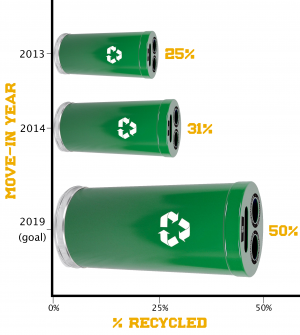 By Rebecca Flannery
By Rebecca Flannery
Staff Writer
Record-breaking recycling feats have been met this year, but McLane Stadium could use some work.
Smith Getterman, assistant director of sustainability, said Floyd Casey Stadium was in a better place with sustainability in its last years than McLane is currently.
“One thing we could continue to improve in is recycling at football games and athletics in general,” Getterman said. “We were doing very well at Floyd Casey, but we’ve had a dip this year moving into McLane. It’s a new facility with a new way of doing things.”
Getterman said they hope to revisit recycling and waste management training with those who work at McLane after the football season is over to improve the effectiveness of the sustainability program already in place.
However, not all new beginnings are off to a bad start. Getterman said this year’s move in event recycled 8.1 tons of waste. This resulted in 31 percent of waste from the event that was diverted from the City of Waco’s landfill, and is a significant increase from previous years, including last year’s 25 percent.
“If you think about how much trash is at move in, the fact that we’re getting rid of 31 percent is great,” Getterman said. “And that’s where we’re going with the rest of campus. We’re hoping that we can use Move In as a model for the rest of campus.”
Rob Engblom, associate director for resident learning, said during move in, incoming freshman bring a range of containers to help with their move into the residence halls. He said there is a group of volunteers responsible to move recyclable materials into their proper receptacles.
“We recruit volunteers to help us recycle during the pregame tailgating portion of all home football games,” according to the Baylor sustainability website. “We also use lots of volunteers during our two day Move In program and can always use more.”
Getterman said in 2007, Baylor recycled approximately 175 tons of materials. As of last year, that number has increased by about 155 percent to 447 tons.
“We have 100 percent coverage all over Baylor properties,” Getterman said. “Our recycling has exploded over the last several years.”
Getterman attributes the growth to increased awareness to the topic. He said one of the most common reasons people don’t recycle is because they don’t know what to recycle, or how to do it properly. Steps have been taken by the department to help the process by adhering stickers on the outside of bins to clearly denote what is meant to go in each recycling bin, Getterman said.
“Recycling is always going to be a big deal for us and hopefully it will always be a successful program,” Getterman said. “As we move forward, the idea will be to cut it off at the head and get people to think more about their consumption, instead of relying on the idea that they can recycle if need be.”
Additional improvements include further separating recycled waste from trash. Getterman said often times maintenance workers empty the recycling and trash into the same receptacle, defeating the purpose of separating the two. After seeing other methods at various campuses, Getterman said Baylor will implement the use of different colored bags for recyclables and other trash to make sure receptacles are put to proper use.






